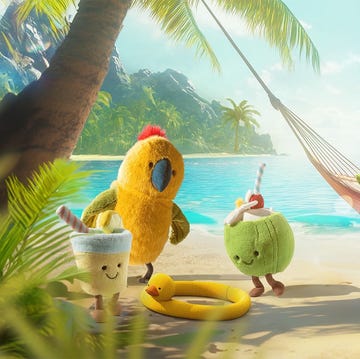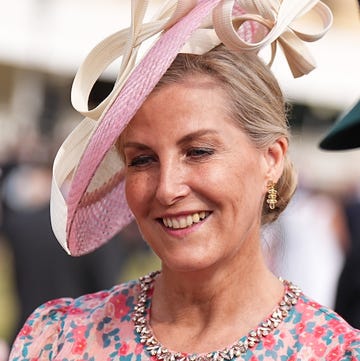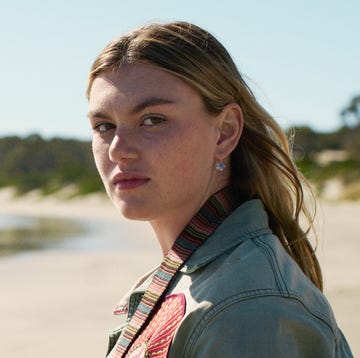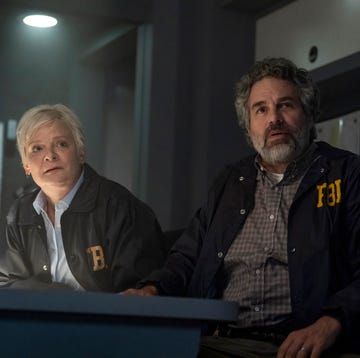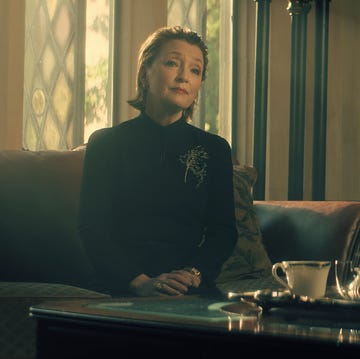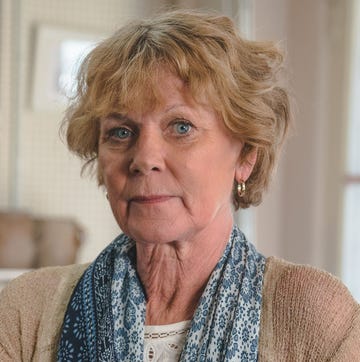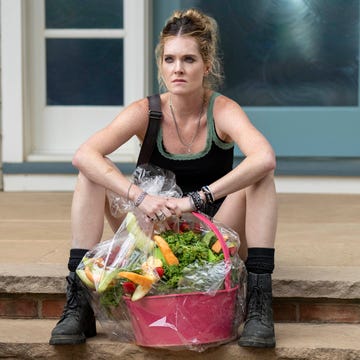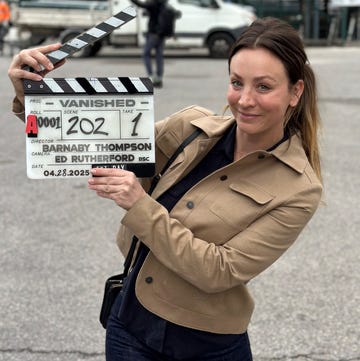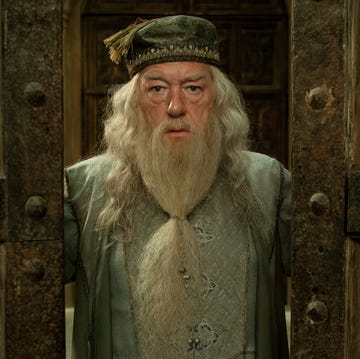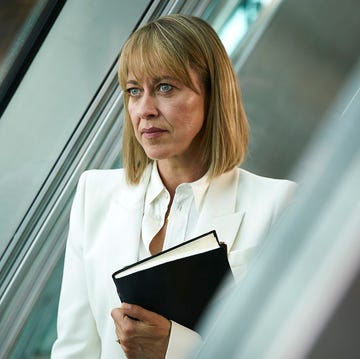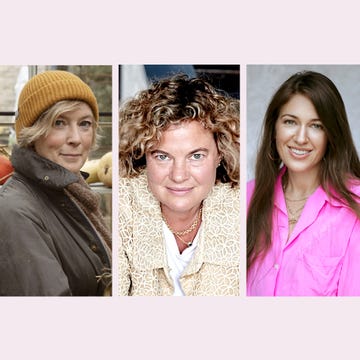I have a Polaroid picture of my mother cuddling my daughter when she was just a few hours old. Jolande is wrapped up in a warm, soft bundle and my mum, Phyllis, is gazing lovingly at her. I was 21 and had just become a single mother. It was a difficult time and Mum offered me strength and support.
It’s one of the last photos I have of Mum. She died when Jolande was just a few months old, so it’s all the more precious. Back then, I could have never imagined my future as it is now. I had so little and faced many setbacks, but I worked hard to turn my life around. Now, I have two wonderful adult children and I’ve found great happiness with my husband, Michael. I also get to do something I love every day: helping women through birth and early parenthood.
My drive comes from my mum. When I was growing up in Birmingham, she worked incredibly hard as a nurse, looking after staff at a local factory.
My dad, Ira, was a bus driver. They worked all hours to give me and my older brother, David, a happy childhood. But their shift patterns put pressure on their relationship. Small squabbles over mundane things such as chores often tumbled into stormy arguments.
They divorced in 1984, when I was 16. Life was suddenly very different. David had already left home, and Mum and I moved into a rented flat. Money was tight and I’d watch Mum worry over how she’d make ends meet. I struggled to focus on studying for my O levels. I kept in touch with my brother, but my relationship with my dad was frayed.
I left school with decent grades and studied childcare at college, and then moved to London to work in a children’s home. Mum joined me and became a nurse at St Thomas’ hospital.
In January 1989, when I was 20, I discovered I was pregnant. The father made it clear I was on my own. When I told Mum, she offered lots of emotional support. She was so excited for the baby to arrive. She knitted tiny clothes and even bought a huge pram.
I suffered badly with morning sickness and Mum was throwing up a lot, too. We laughed about it at the time, imagining it was her body acting in sympathy with mine. But the sickness never stopped for her. When I was three months pregnant, she was diagnosed with carcinoma of the kidney, a type of cancer, which had spread everywhere. It was devastating. I was coming to terms with becoming a mother while worrying about losing my own mum.
In August 1989, I went into labour nine weeks early. I was rushed to St Thomas’ hospital. Mum was still working despite her illness. She was working when I went into labour, so I was on my own with no birthing partner to support me.
Despite being premature, Jolande was thankfully healthy and weighed 3lb 12oz. Mum rushed over to the special care unit when she heard the news.
Mum was a doting grandma, but time was running out. She became more frail by the day and died when Jolande was only four months old. I was lost without her. After taking maternity leave, I returned to the children’s home and took on extra agency shifts, stretching my pay cheques to support us both.
When Jolande was three, I reconnected with a man I knew from my school days. We began dating and I became pregnant. I hoped things would be different, but by the time my son, Jadon, was born, the relationship was over.
I decided to make a fresh start and moved back to Birmingham in 1994, when Jadon was one and Jolande five. I enrolled on an English and Education degree at university, with the aim of becoming a teacher. After Mum’s death, I’d rebuilt my relationship with my father. He looked after the children when I was studying and working two jobs to get by.
I had very little money. Each week, I’d shop with the same grocery list, because I knew exactly how much it cost. We had no lavish things, but found ways to have fun, using parks and playgroups.
Those years were tough, but over time things became easier. Decades later, with my children grown up, my life looked very different. Rather than teaching, I was a deputy manager of a Sure Start Children’s Centre. I was also part of a meet-up group for Black professionals. I made lots of friends in the group, including Michael. I wasn’t looking for love, but I remember glancing at him across the table one night and thinking, ‘Actually, he’s very nice.’ That was in 2010, and we married three years later.
Through my job, I met many single mums who were in the same position I’d been in all those years ago, struggling to get by. I held baby massage classes to help with bonding and there was always lots of chatter between the mothers, comparing their birth experiences. I was really shocked that most of their stories were tinged with sadness and disappointment. Often, they felt alone or unsupported by medical professionals.
In 2012, I referred a young, single pregnant woman to a doula and saw the work that they do and the difference they make. Doulas are not healthcare professionals but are trained companions who can help mums through childbirth and the first few weeks of parenthood. People often think doulas are only for privileged families, but they can be a good resource for any parent and support NHS hospital births and homebirths.
I was looking for a change and so enrolled on a five-day intensive course to train as a doula, which covered areas such as birth physiology, active listening skills and breastfeeding. I had a mentor who guided me at the start.
One of my first clients was a 15-year-old who was living in residential care. During her labour, she asked me to rub her feet. After her child was born safely, she told me that her mother used to rub her feet as a small child. She said that it was this comforting gesture that helped her through the labour.
Weeks later, she surprised me with a plate full of home-cooked food. A new mum with no family, yet she’d still found time to make me lunch to thank me. I was so taken aback by the gesture that I cried.
There’s a lot of happiness in my work, but there are moments of sadness, too. Black mothers are up to five times more likely to die around the time of birth for various reasons. So for a lot of Black families, part of that joy is replaced with worry.
Now, I’ve set up a Facebook community called Black Mamas Birth Village. It’s a space for Black mothers to talk openly, without fear of judgement or intrusive questions. It opens up conversations that you can learn from, which you might not get from midwives or antenatal classes.
I’ve witnessed more than 100 babies being born, including all four of my grandchildren. Babies bring hope and joy. Every birth is as much of an honour to attend as the last.
I now mentor trainee doulas. I’ve been recognised as one of the Midlands’ most popular and well-respected doulas, and I was recently named Rising Star at the Black Owned Birmingham Business Awards. As doulas, our role is to work quietly in the background, so that recognition felt very special.
I’ve come far since becoming a mother myself. Often, it helps to reflect on my journey when I tell a single mother, "I remember going through that, but I’m at peace now. Things can and do change."









